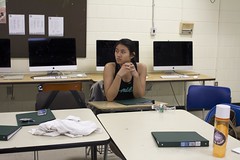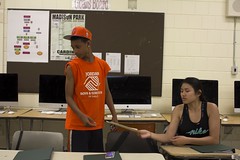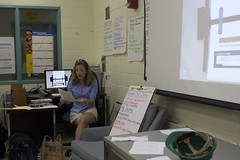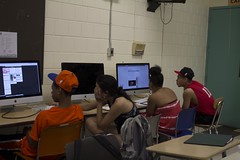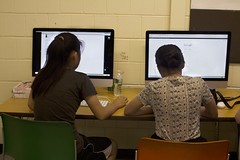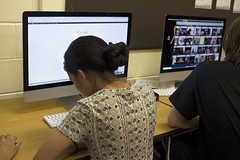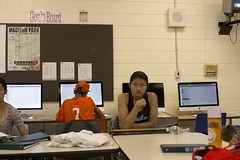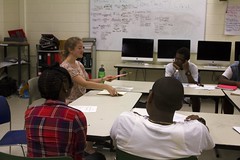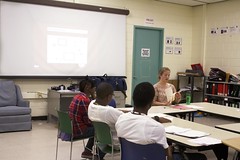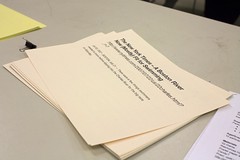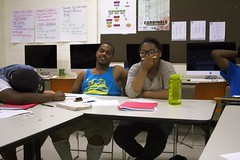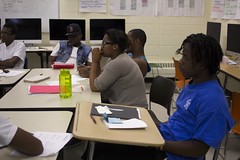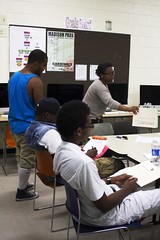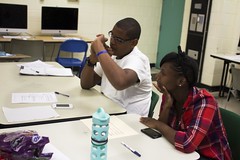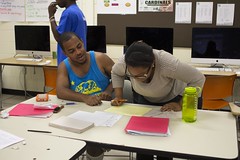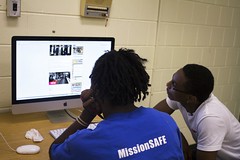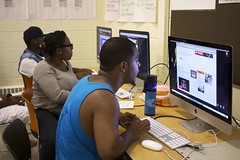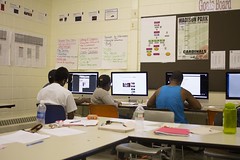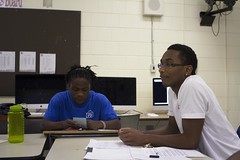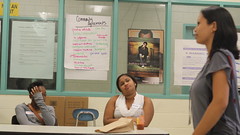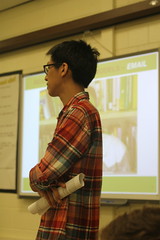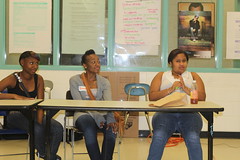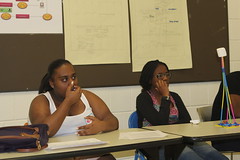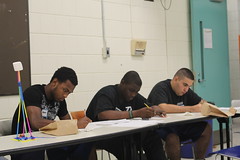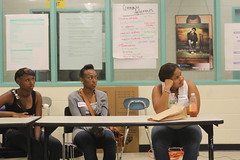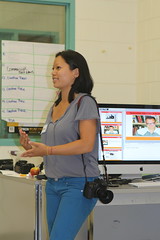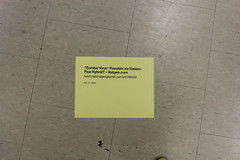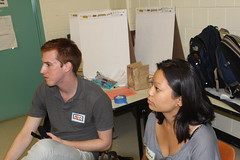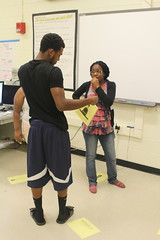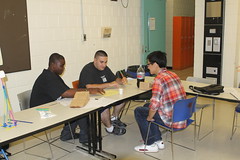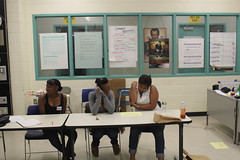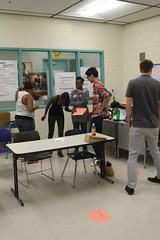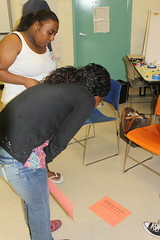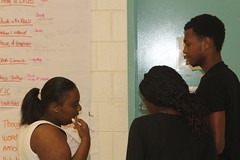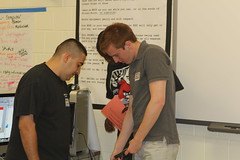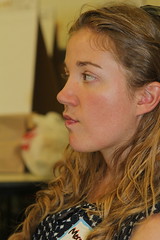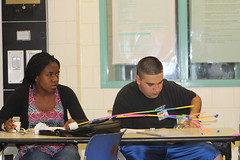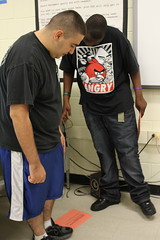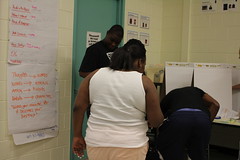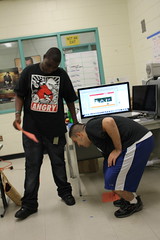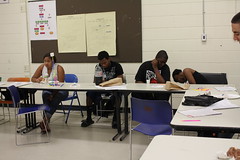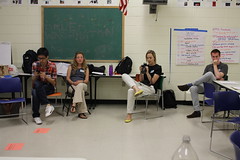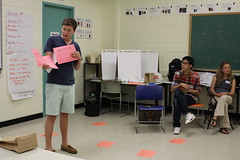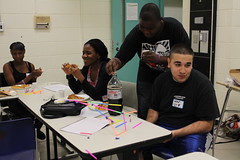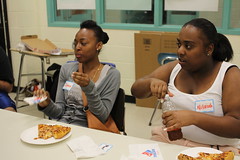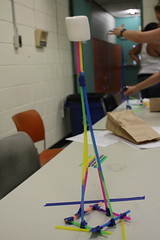Press Pass TV -a Boston based organization- targets youth as consumers of media and leads them through an interactive learning experience, teaching them to become critical thinkers, community producers, and agents of change. Through partnerships with community based organizations and schools, Press Pass TV gives students the tools and skills to make change in their communities through video journalism and social action.
Update: Workshops with Press Pass TV, July 2013, Boston, MA:
In July 2013, the Youth and Media team visited Press Pass TV again for two workshops. This time, the team aimed to discuss information quality in the context of doing research, asking participants to consider certain platforms, such as Twitter, as alternative sources. To find out more, click here.
Update: Workshop with Press Pass TV, July 2012, Boston, MA:
In July 2012, the Youth and Media team, again, visited Press Pass TV at Madison Park Technical Vocational High School in Roxbury, Boston. In this workshop, the team aimed to deepen participants’ understanding of factors to take into consideration when searching for and evaluating information online through playing the Information Quality Game. Then, building on this understanding, youth engaged in a design session to suggest strategic promotional campaigns targeting multiple audiences for Press Pass TV.
Workshop with Press Pass TV, July 14, 2011, Boston, MA:
On July 14, 2011, the Youth and Media team visited Press Pass TV at Madison Park Technical Vocational High School in Roxbury, Boston.
The success of our visit to Press Pass TV reflects, more than anything else, the amount of time we spent in preparation – the numerous meetings we held to identify our key goals, to design, test, and refine our learning activities. The pedagogical concepts of situated knowledge, experiential learning, and constructivism guided our curriculum design.
Throughout the design process we relied heavily on the advise of members of our own team, of other interns, and of various Berkman Klein fellows and Research Assistants. It was largely due to such collaboration that we were able to develop a learning activity both fun and informative.
Press Pass TV
We met up with Joanna Marinova and her team during their second week at the summer camp which was held at Madison Park Technical Vocational High School, Boston. The focus of this camp was video production and journalism.
During the first hour, we talked with the young media producers about how they use Facebook and YouTube, and discussed with them their experiences at the camp thus far. Some of the teenagers interviewed members of the YaM team, demonstrating their burgeoning skills in interviewing, videography, and journalism.
During the second hour, we ran a workshop on news, searching, and evaluation. We began by exploring their ideas about news stories and everyday sources of information. Through a ‘Sticky Note’ exercise we talked with the kids about different news sources and their beliefs towards them. Each student wrote words on sticky notes describing their positive, negative or neutral feelings towards different sources (i.e. blogs and newspapers) and put them on the board. We then had a short discussion about how people value different sources of information. The goal of the exercise was to make students aware that their own opinions about certain news (or rather information) sources influences which sources they are most likely to use. When asked what they thought the aim of this exercise was, one of the participants said“I think the purpose of this exercise was to get the opinions of all the individuals about what each source of media means to them and how reliable and/or effective they feel the source is.”
After this warm-up activity, we introduced the participants to a an information quest and asked them to form groups of three. We told them that a blogger in Syria had been reported missing. The goal for each group was to find out what happened to this Syrian blogger. They had to answer three questions within five minutes and they could use an online search engine. We read the questions out loud and they had to write down which search terms they used and why. The groups had to find out as much information as possible in a limited amount of time (5 minutes per question). Each group had one YaM team member at its side for answering specific questions about their task. All the participants were really involved and engaged in the activity and the teens seemed to be having a lot of fun. When the time was up, each group presented their findings and we created a table on the board comparing the different answers, key terms, and sources to the questions.
All of the groups successfully figured out that the story was about a kidnapped lesbian Syrian blogger from Damascus. They also found out her father’s name and that she had a cousin who had helped her and had reported her missing. The groups mainly had used the first link provided to them by Google and some checked a second source to be sure of the answer. We provided a timeline of the story highlighting the differences between the mainstream news sources and blogs. We asked the groups if they could find out what really happened to Syrian blogger.
After listening to their answers we confirmed (as some of the groups had figured out) that he Lesbian Syrian blogger did not exist at all. It was a hoax. The gay Syrian blogger from Damascus had been made up by an American man who had wanted to make a point and tell a particular story. Surprisingly, only two teams figured this out.
We then discussed how news organizations also did not realize immediately the hoax surrounding this lesbian Syrian blogger. We told them that journalists and bloggers became suspicious about the story because they could not find out enough information about the gay girl from Damascus. Eventually, another journalists found out the truth and broke the story globally. The kids were surprised to find that sometimes even the news can get it wrong. As a wrap-up, we talked with them about their projects for the following weeks, discussing how they would also have to do background checks and how the searching and evaluating exercise provided them with some additional insight.
It was an inspiring afternoon. The feedback we received back from the participants was very positive, even though they seemed to enjoy the second part of the workshop better. One the participant framed the experience as follows: “it helped me to not believe the first thing i see .”
Team Reflections
Press Pass TV was our first foray into the community – our first attempt at transporting our work beyond the Berkman Klein Center. Going into the day, we were somewhat uncertain, curious about how students would respond to our ideas and learning activities. We were immediately thrilled by the students at Press Pass TV. From the moment we walked in, they were engaged, excited, and willing to participate wholeheartedly in the activities. For many of us, the success of this visit added a new dimension to our work, making more meaningful our efforts, and bringing alive for us what before had been only in our imagination.




